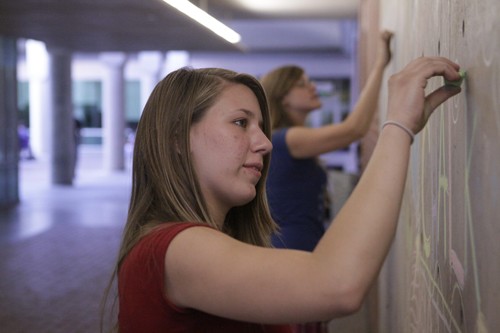President Robert Shelton asked UAPD Monday afternoon to drop charges against two students arrested for drawing protest signs in chalk on the UA campus.
Campus police arrested a second chalk artist, Evan Lisull, a political science senior and an author of the campus news blog DesertLamp.com, just before dawn yesterday.
Lisull was making chalk drawings to protest Thursday’s arrest of graduate student Jacob Miller, who arrested for his own chalk art after a rally protesting budget cuts.
By noon yesterday, students had distributed thousands of chalk sticks on campus in a show of solidarity.
After the University of Arizona Police Department arrested a graduate student Thursday and charged him with criminal damage for writing in sidewalk chalk before a protest, student support for the chalk-writer swelled.
Students who had never met Jacob Miller, the arrested graduate student, started taking up arms online, on Facebook and in the form of comments on the Daily Wildcat’s Web site, and on campus, organizing over the weekend to distribute chalk and write messages of support.
Lisull, one of the organizers of the mass chalkings, was arrested after writing messages like “”chalk is speech”” and “”freedom of expression”” on campus, but not before organizers said they bought two Walmarts out of sidewalk chalk and started distributing it by the bucket.
“”I would just love it if there was chalk all over campus by the end of the day,”” said Eric Moll, a senior in environmental science and one of the distributors of the chalk sticks, which were accompanied by a note reading, “”Free Chalk for Free Speech.””
But by the end of the day, they had accomplished something more.
Kayla Crofoot, a pre-physiology freshman, was chalking the Manuel T. Pacheco Integrated Learning Center this afternoon along with several other people who had never met either Miller or Lisull, because, “”Someone was arrested for speaking their mind,”” she said. “”In chalk, no less.””
She called the arrests an “”abuse of power”” by UAPD and said she would write all day if necessary.
“”If it bothers (the administration) that bad,”” she said. “”It’s called water, it washes it right off.””
The Office of University Communications issued a statement at 3:15 p.m. stating President Robert Shelton had instructed them to stop citing chalkers, and to dismiss charges against the two students cited.
“”UAPD was doing it’s job to cite students for illegal behavior,”” Paul Allvin, associate vice-president for communications said in the release.
“”(Shelton) believes the best course of action is to handle these incidents as possible Code of Conduct violations through the Dean of Students Office.””
“”It’s a good step by President Shelton,”” said Lisull,””That having been said, it’s not over; the issue’s not resolved.””
The Dean of Students Office did not return phone calls by press time to answer questions about possible university consequences for chalkers by deadline.
To Kevin Kemper, an assistant professor of journalism who teaches classes in media law and freedom of expression, the real issue is whether the citations were targeting the content, and not the medium.
“”The use of sidewalk chalk on sidewalks, as far as I can tell, is not prohibited by the Student Code of Conduct or by state law,”” he said.
The Foundation for Individual Rights in Education, a non-profit dedicated to defending individual rights at colleges and universities, gave the UA a speech code rating of “”red,”” the organization’s worst rating, in April 2009 for, “”at least one policy that both clearly and substantially restricts freedom of speech.””
“”There have been a number of concerns in the past few years about institutional attempts to silence student speech,”” Kemper said. “”And this incident, in my mind, seems to fit that trend.””








